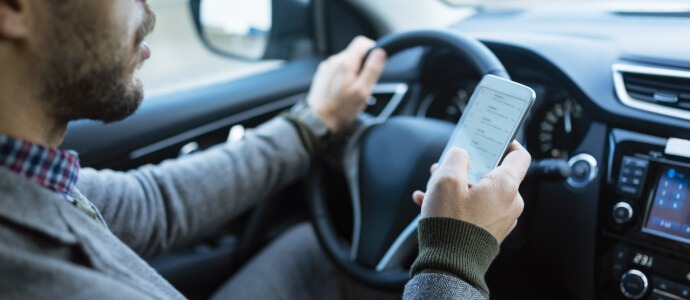Despite the efforts of state legislators and public safety campaigns, distracted driving remains a leading cause of automobile accidents. At Cooper Schall & Levy, our car accident attorneys understand the devastation that a distracted driver can cause to other motorists and pedestrians. We fight to hold these drivers responsible by demanding the compensation that you or your loved ones deserve.
What Is Distracted Driving?
Any activity that takes the driver’s focus away from driving and safe operation of the vehicle can be considered distracted driving. This covers a variety of behaviors:
- Texting, emailing and talking on the phone
- Eating, drinking and smoking while driving
- Talking to other passengers in the vehicle
- Paying attention to children in the backseat
- Listening to the radio
- Fiddling with the radio, navigation system or other parts of the vehicle
- Thinking about something else other than driving
- Personal grooming while driving
Texting is an especially troubling distraction and one that seems largely immune from bans and other efforts to rein it in. The NHTSA estimates that sending or reading a text can take a driver’s eyes off the road for up to 5 seconds. Traveling at 55 miles per hour, that’s like closing your eyes and driving the length of a football field.
Distractions are made worse with inexperienced drivers, heavy traffic, and adverse weather conditions. Most drivers understand these risks, but believe they are somehow immune to them. “It’ll only take a second,” many of them say. However, that second can change the rest of someone’s life.
Distracted Driving And Negligence
To recover damages after an automobile accident in Pennsylvania, the victim must show that the at-fault driver was negligent. This requires proving four elements:
- The driver owed a duty of reasonable care to the victim. This means the driver has an obligation to follow traffic laws and drive safely under the circumstances.
- The driver breached the duty of care. Anyone who engages in distracted driving is not acting safely, and is therefore breaching their duty of reasonable care.
- The driver’s breach of duty was the cause in fact and proximate cause of the victim’s injuries. Essentially, this means establishing a legally sufficient causal connection between the driver’s actions and the harm to the victim.
- The victim suffered damages as a result of the driver’s actions. These include monetary damages, property damage, and more.
Showing there was a breach of duty is usually the most difficult step. Insurance companies often try to claim that some other cause, such as another driver, was responsible for the victim’s injuries. They are reluctant to pay large claims and may offer a paltry sum to settle the case – if they don’t try to outright deny it.
How To Prove Distracted Driving
Many cases of distracted driving involve the use of a cell phone or other electronic device. Under Pennsylvania law, it is illegal to use a device to read, send, or write any text-based communication while driving. There is currently legislation pending in the state Senate to ban talking on a cell phone while driving, but for now it is still legal. Nonetheless, drivers still have an obligation to the other vehicles on the road to avoid being distracted while operating their vehicle.
In the event a cell phone is to blame for an accident, a subpoena of phone records may be necessary to demonstrate the driver was using the phone. Police reports are often helpful to establishing what happened, but the victim typically needs to dig deeper. One way to do so is to speak with witnesses who may have observed the driver using the phone immediately before a crash.
Oftentimes witnesses do not directly observe cell phone use and other forms of distracted driving, but they can see their effects. Swerving, driving across lanes, and speeding are typical consequences of being distracted. Drivers who aren’t paying attention display these and other behaviors for witnesses to see. Speaking to those witnesses could be vital to your claim.
A skilled attorney will conduct their own investigation to uncover all relevant facts in your accident and reconstruct what exactly happened.
How To Prove Your Damages
A common tactic of insurance companies is to settle quick and cheap. These companies know that the full extent of a person’s injuries are often not clear until long after the accident. The longer the case drags out, the more they will potentially have to pay.
Working with an attorney, you can demand a fair amount of compensation that will help you recover from your injuries. You may need to see a specialist or require several trips to the doctor before you know what the accident has done to you. It’s important to keep in mind that you only get one chance at recovering damages or trying a case. If you settle or go to trial and don’t have the full picture of your injuries, you won’t get to ask for compensation for any new injuries at a later date.
Accident victims often miss time from work while they are recovering. In some cases, they are unable to return to work at the same level of productivity (or at all). Calculating these damages requires the input of expert witnesses and putting together admissible proof that meets the rules of evidence. Having an attorney is essential when taking these claims to the insurance companies.
Contact Our Philadelphia Distracted Driving Accident Lawyer Today
If you or a loved one have been hurt by a distracted driver, you deserve the most compensation for your injuries. Turn to the dependable accident attorneys of Cooper Schall & Levy. We stand up for our clients’ rights by providing them with powerful representation and dependable service. Please contact our office today to set up a free consultation. You will not pay any attorney’s fees until we recover for you.
Cooper Schall & Levy personal injury lawyers serve Philadelphia, Pennsylvania as well as neighboring counties such as Montgomery County and Delaware County and cover neighborhoods such as Norristown and Drexel Hill.


